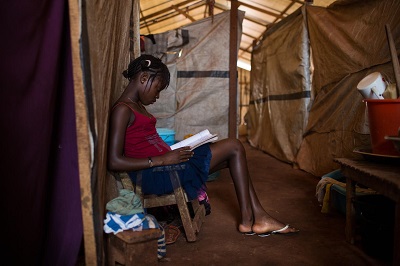Central African Republic: Nearly one in five children is a refugee or internally displaced
Focus on children crucial as aid officials meet in Brussels to secure aid package
As the fragile recovery continues, more than 850,000 people in Central African Republic – half of them children – are still on the move, either internally displaced or refugees in neighbouring countries, UNICEF said on Nov 15.

Alison, 14, reads a book beneath a makeshift shelter at the Grand Séminaire Saint Marc de Bimbo site for internally displaced people, in Bangui, Central African Republic.
Insecurity in the aftermath of the conflict has prevented most of the 920,000 people displaced in early 2014 from returning home. Today, 383,000 people remain displaced inside the country while 468,000 have sought refuge in Cameroon, Chad, Democratic Republic of Congo, and Congo – with Cameroon hosting more than half of these refugees.
“When children return to their communities as security improves, they will need to have schools and clinics to come to,” said Christine Muhigana, UNICEF’s Deputy Director for West and Central Africa. “Access to quality health and education is the cornerstone of any recovery, and the foundation for a peaceful future.”
Violence and widespread displacement have made children especially vulnerable to health risks, exploitation and abuse, leaving more than 1/3 out of school and 41 per cent children under five suffering from chronic malnutrition. An estimated 6,000 to 10,000 have been recruited into armed groups since 2013.
“The country is in a better place now,” said Christine Muhigana, UNICEF’s Deputy Director for West and Central Africa. “But this is still one of the world’s most dangerous countries for children, and renewed violence threatens to undermine signs of progress.”
Most recently, repeated flare ups of violence have forced several non-governmental organisations to significantly scale down their interventions in parts of the country, slowing the progress of the national recovery plan. An attack on the Kaga Bandoro camp for internally displaced people last month left 37 civilians dead, including educators participating in a UNICEF-supported programme.
Aid officials are meeting in Brussels on 17 of November to report on the recovery progress and seek funding to continue their programmes. Leaders from the Central African Republic will make the case for a USD 3 billion aid package to global donors, including the European Union, the World Bank, and the United Nations.
UNICEF calls on Central African leaders and global donors to put children first in the recovery plan by prioritizing basic social services like health and education for the most vulnerable, noting that only a balanced recovery plan with equity as the guiding principle can lay the foundation for a peaceful future.
Economic inequality played a major role in the initial eruption of violence and conflict in 2102. Ethnic tensions and disparities in opportunities between urban and rural populations fueled a resentment that still endures. The issues of justice, protection and the fight against corruption are key to building a country that protects its citizens and enforces the rule of law.
Working with the government and partners, UNICEF is strengthening the education system by training more than 1,300 teachers and building or repairing 172 schools in 2016 with funding from the European Union and the Global Partnership for Education. Existing projects are set to expand in order to bolster primary health care, improve access to clean water and offer psychosocial support for children who’ve experienced violence.
Efforts to reach every child in the Central African Republic are limited by significant funding restrictions. Of the $55.6 million required in 2016 to provide basic services to children in the country, only $20.4 million has been received, leaving many projects under resourced and reduced in effectiveness.
Source: United Nations Children's Fund
- 320 reads
Human Rights
Fostering a More Humane World: The 28th Eurasian Economic Summi

Conscience, Hope, and Action: Keys to Global Peace and Sustainability

Ringing FOWPAL’s Peace Bell for the World:Nobel Peace Prize Laureates’ Visions and Actions

Protecting the World’s Cultural Diversity for a Sustainable Future

Puppet Show I International Friendship Day 2020

